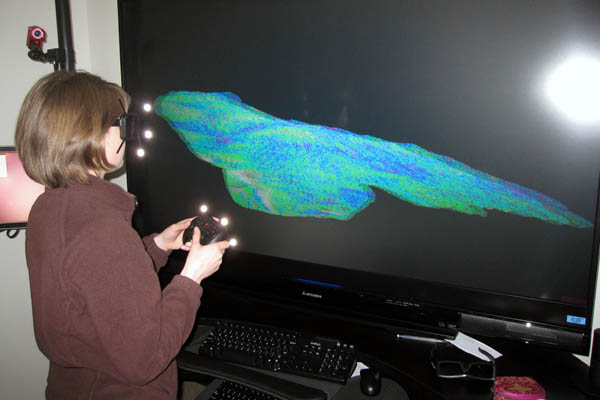Idaho State University, Boise Center Aerospace Laboratory (BCAL) is developing new methods to visualize and interact with hyperspectral and LiDAR remote sensing data. As these data are becoming increasing complex, new methods for fusing and interacting with the data are necessary for leveraging their multidimensionality. With a new immersive
3D system resulting from a collaboration between Idaho Universities and the Idaho National Laboratory (INL), scientists can explore multiple dimensions of data that, until now, could only be viewed two dimensionally.
A traditional IQ-Station (also known as CAVE™) is housed in a room with projectors displaying images on all surfaces, while cameras are used to track the movements of the user. The user wears 3D glasses and operates a controller to view and interact with data in a 3D immersive environment. ISU’s IQ-Station displays images on a large screen instead of on the walls. The user can interact and manipulate the data across a volume or area projected on the screen. IQ-Stations are portable and less expensive than full CAVE™ systems, and can be useful in many applications where full-featured CAVE™ systems are not needed.
The IQ-Station at ISU BCAL features a 3D 73-inch Mitsubishi LCD display and optical tracking system by NaturalPoint and relies on a high end computer to run Vrui, a virtual reality software developed by UC Davis that performs the 3-D rendering. In addition to remote sensing data, MRI and CT scans (medical imaging), CAD drawings (engineering), and complex molecular diagrams (chemistry) can also be visualized in the IQ-Station for scientific interaction.
The IQ-Station at ISU BCAL is currently being used for several research projects. These include a multi-temporal study of an active landslide located in the Salmon Falls area 16 miles south of Hagerman, ID, and a line of sight study to aid visual studies under forest canopies for artificial intelligence and landscape modeling.
INL has also donated IQ-Stations to Boise State University and University of Idaho.


